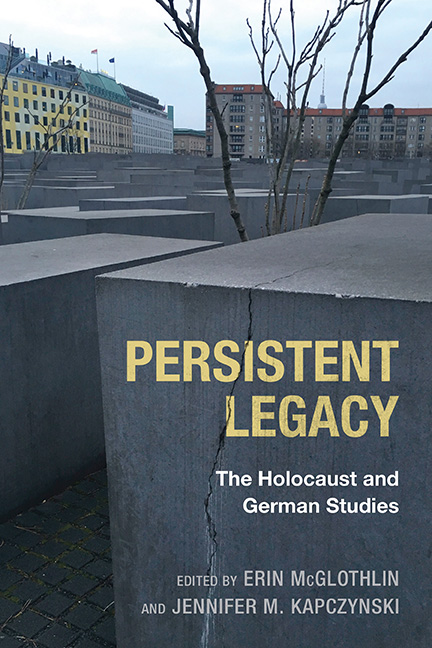Book contents
- Frontmatter
- Contents
- Acknowledgments
- Introduction
- Part I Abiding Challenges
- Part II The Holocaust in German Studies in the North American and the German Contexts
- Part III Disentangling “German,” “Jewish,” and “Holocaust” Memory
- Part IV Descendant Narratives of Survival and Perpetration
- Part V Remediated Icons of Memory
- Part VI Holocaust Memory in Post-Holocaust Traumas
- Notes on the Contributors
- Index
15 - The Memory Work of William Kentridge’s Shadow Processions and His Drawings for Projection
Published online by Cambridge University Press: 17 June 2021
- Frontmatter
- Contents
- Acknowledgments
- Introduction
- Part I Abiding Challenges
- Part II The Holocaust in German Studies in the North American and the German Contexts
- Part III Disentangling “German,” “Jewish,” and “Holocaust” Memory
- Part IV Descendant Narratives of Survival and Perpetration
- Part V Remediated Icons of Memory
- Part VI Holocaust Memory in Post-Holocaust Traumas
- Notes on the Contributors
- Index
Summary
IN SOME OF MY PAST WORK on the visual arts I have addressed ways in which Holocaust memory, together with its images and tropes, has migrated into other geographic, political, and historical contexts—into Argentinean memorial projects and Marcelo Brodsky's photo work, into installations by Colombian artist Doris Salcedo and Polish artist Miroslav Balka, and into literary and visual work on the Indian Partition in Anita Desai's fiction and Nalini Malani's video-shadow plays. Such migrations of discourse fragments into non-related later contexts are not to be seen as equations of the Holocaust with other traumatic events and experiences. They rather testify to the powerful model of Holocaust discourse for attempts to come to terms with histories of genocide and state terror elsewhere in the world. In each case the memory politics are different, requiring linguistic and historical knowledge that does not come easy to Germanists. But the centrality of the Holocaust in current memory, genocide, and human rights debates across the world has made a geographic expansion of German studies unavoidable, while at the same time posing practical challenges and difficulties for deep transnational understanding and analysis. There is cognitive and political gain to be had if German studies moves beyond the Holocaust memory bubble and its national confines. Much comparative and transnational work is currently being done in our field. Just as international artists work increasingly out of the ruins of European modernism these days, the issues raised by Holocaust memory now have a global field of resonance, often conflictual, polemical, and politically loaded. This is where German studies can intervene and establish links to other geographic and disciplinary fields. The increasingly transnational dimension of Holocaust studies must never ignore the specifically German dimension of the Holocaust, which continues to haunt German postwar generations and German politics to this day. But in the context of ongoing genocides, ethnic cleansings, and massacres in our own time, the recourse to theories of uniqueness and unrepresentability, so strong still in the 1990s, has become counterproductive to a deep understanding of memory politics in our world.
- Type
- Chapter
- Information
- Persistent LegacyThe Holocaust and German Studies, pp. 290 - 304Publisher: Boydell & BrewerPrint publication year: 2016

